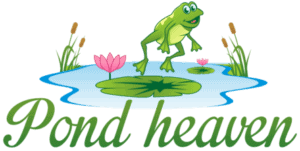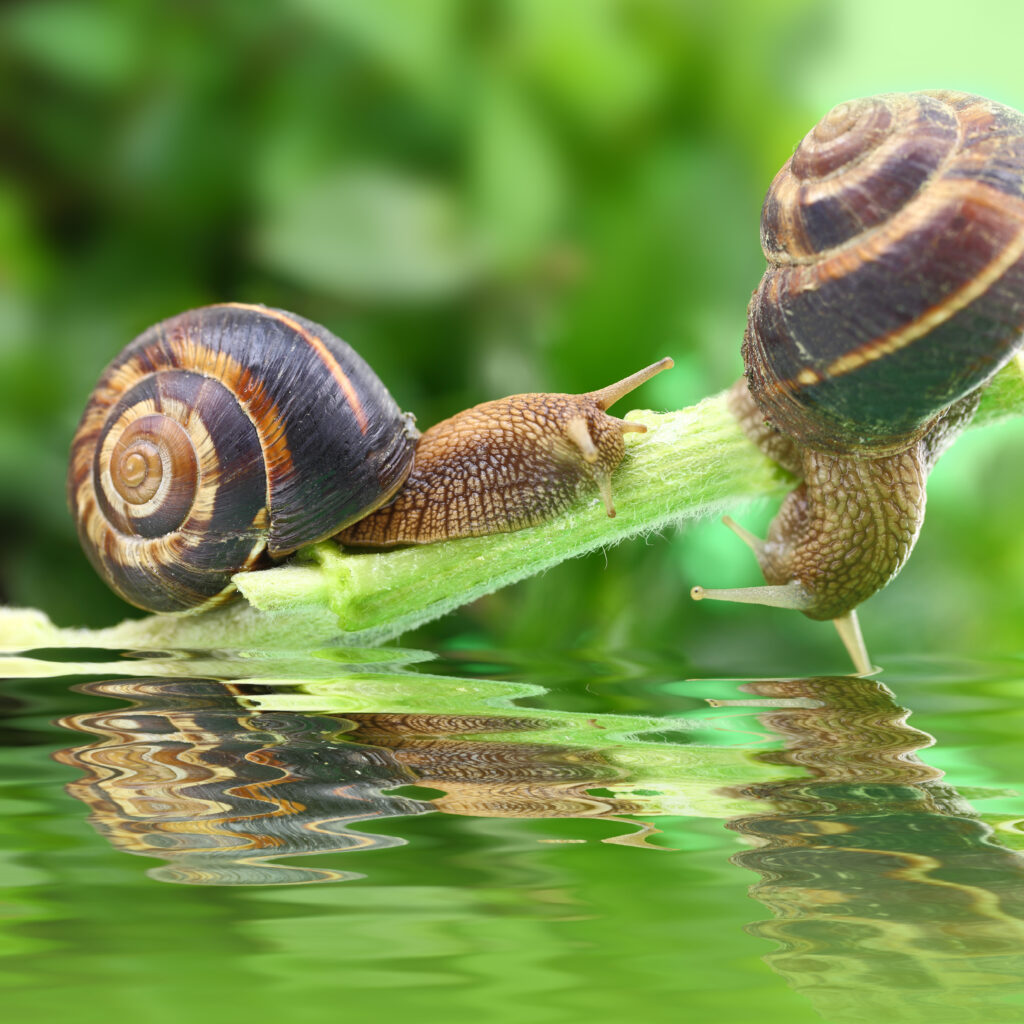
Can the snails in your pond or aquarium be a food source for your Koi? While Koi have a bottom feeder’s mouth configuration, they will forage at all depths and are equally happy to consume animal or vegetable foods. Small snails are certainly a welcome addition to a Koi’s diet.
Koi are omnivorous, but snails are generally not a preferred food. They may eat snail eggs or newly-hatched individuals that are small enough to fit into a Koi’s mouth, but larger snails are not likely to be of interest. Most adult specimens are likely to be left in peace.
Since adult snails will probably be ignored, Koi are not likely to significantly impact a snail population. Still, the relationship between the fish and the gastropod populations should not be underestimated. The attractiveness and health of the pond or aquarium may be affected, for better or worse, by the balance of its inhabitants.
Pro Tip: If you’re tired of wasting money and making costly mistakes on the koi-keeping hobby or are thinking about buying koi fish but don’t know where to start, I strongly suggest you check out this ebook. I recently read this ebook, and it contains SO much useful information, such as:
- 3 proven steps to identify koi fish diseases
- WARNING: 3 things you should NEVER do when it comes to caring for koi
- When to seek professional help when it comes to looking after your koi
Do Koi Eat Snails In Your Pond?
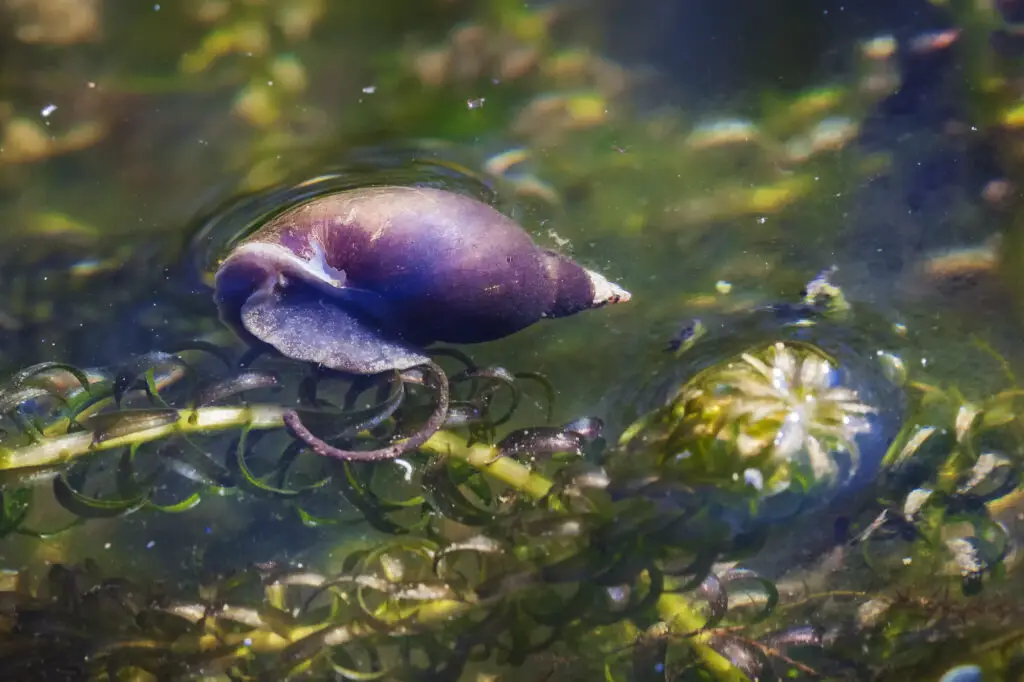
Koi, and their relative’s goldfish, are generally robust fish with a healthy appetite. They will happily eat snails to supplement their varied diet, including other small invertebrates and vegetable matter. Larger adult snails are likely too big for the fish to swallow.
Can Snails Be Harmful To Koi?

Healthy Koi will not suffer from eating aquarium or pond snails. They may even eat common garden snails. In general, snails are not their preferred food, but their presence may present other health problems.
Snails are well-known hosts in the life cycle of certain parasites, some of which may infect freshwater fish. Fishery Biologist Andrew J. Mitchell of the US Department of Agriculture has researched a parasitic infection for which there is currently no cure. His current view is that this parasite is unlikely to affect aquarium or pond specimens, but much research is still underway.
Can You Keep Snails In The Same Pond As Koi?
Some people want snails in their ponds for the benefits they bring and to add diversity to the pond.
Several varieties of snails can add variety and attractiveness to an aquarium. Nerite, Apple, and Trumpet Snails are popular, but to survive, the snails would have to be too large to fit in the Koi’s mouth.
A word of warning. The Cone snail, Conus geographus, is a dangerous species. It paralyzes prey by injecting venom through its proboscis and will usually kill fish within seconds. Even animals as large as humans are at risk, and The Academy of Natural Sciences of Drexel University records fatalities from handling cone snails carelessly.
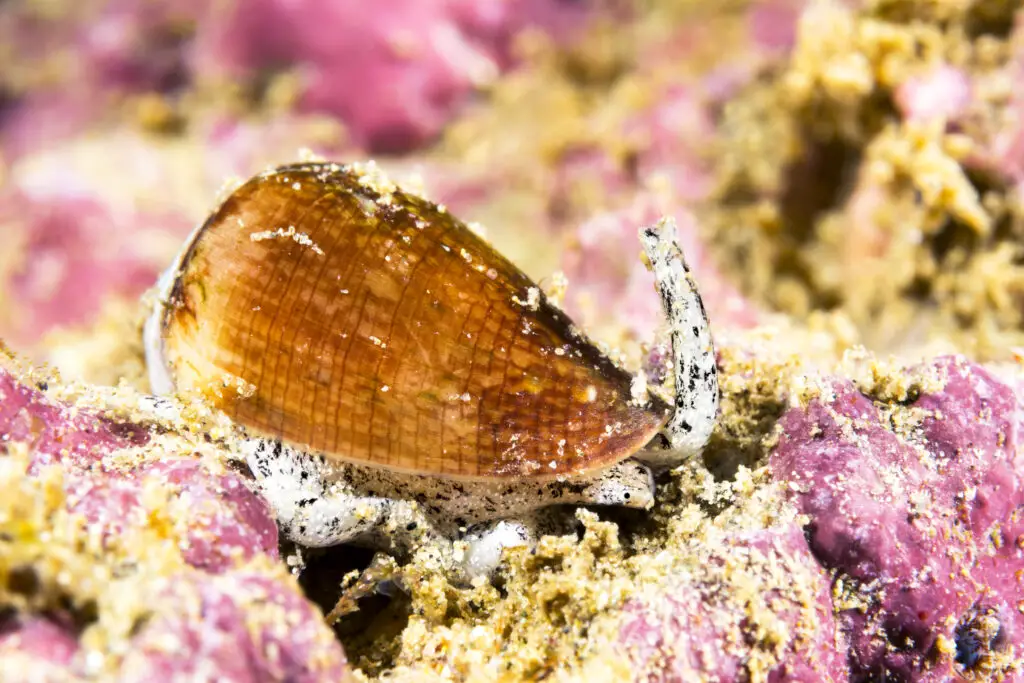
Will Koi Control Snails In Your Pond By Eating Them?
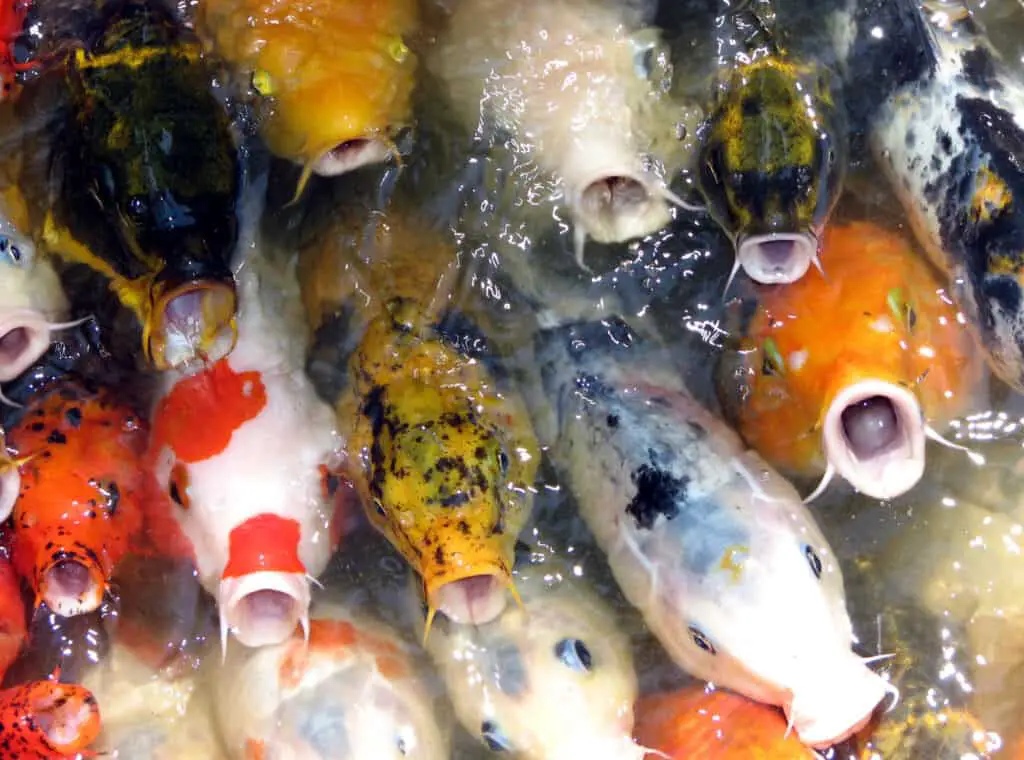
Although Koi will eat snails, they are not a large enough part of their diet to act as population control. Other methods to control the snails would be required.
How Do I Get Rid Of Snails In My Koi Pond
Since Koi seem unlikely to be able to keep down snail populations, getting rid of the pests boils down to three options: Predators, Bait, or Poison.
Predators That Target Snails
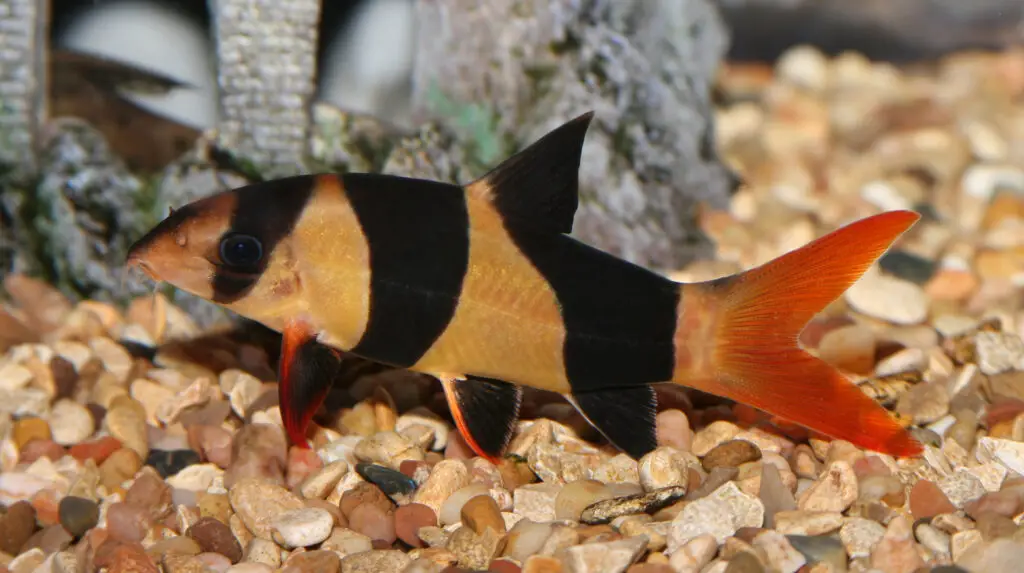
Koi are omnivorous and will eat vegetable matter, insects, and snails, so that diet may seem to provide a simple answer to the problem. The difficulty is that, as bottom feeders, they spend much of their feeding time sifting through the soil and pebbles at the bottom of the pond in search of small prey and seeds.
Koi are not noted for their snail consumption. Hoping that the Koi will eliminate a snail infestation is over-optimistic.
Other fish species, like loaches and gouramis, are well-known snail eaters and can make quick work of gastropod nuisances.
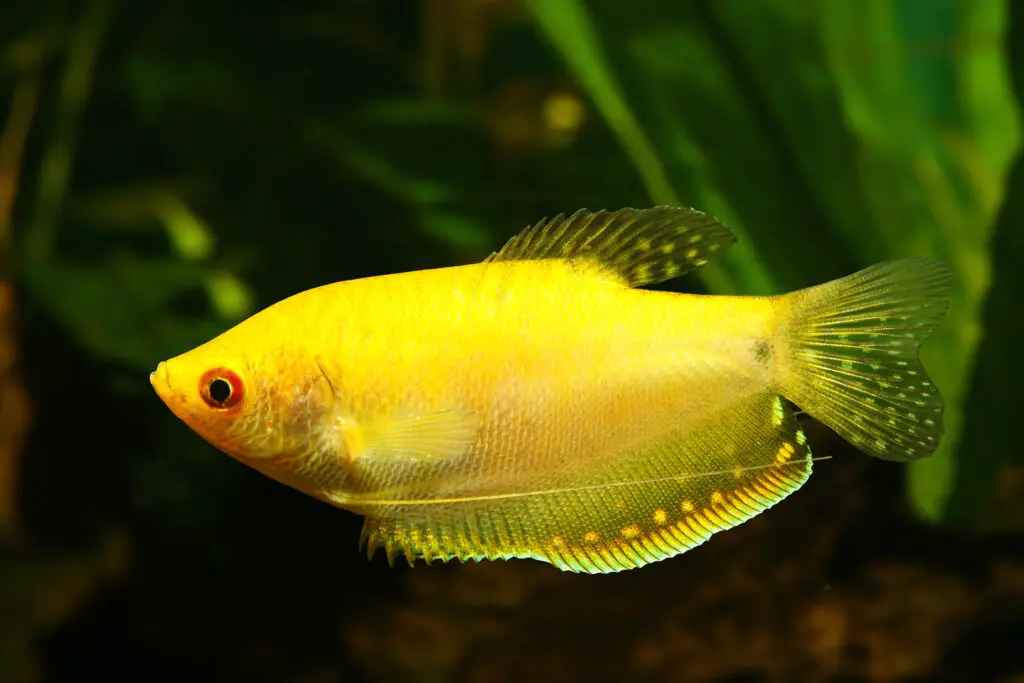
The question is whether introducing other fish species into a Koi pond would be advisable. Koi are not naturally aggressive and usually live peacefully with others of their kind and several other snail-eating fish species.
Although loaches and gouramis are also omnivorous, they are known to have a voracious snail appetite. They are often introduced into ponds to control snail infestations, but there is no guarantee that they will immediately eat all the troublesome snails. They can grow as large as adult Koi and are not generally aggressive fish, so a compatible, snail-unfriendly community could be established.
Carnivorous snails are another option. It may sound contradictory to introduce more snails into a pond already over-burdened by gastropods, but assassin snails can make short work of other species you would like to be rid of. Some assassin snails have specific water quality requirements, so this should be considered.
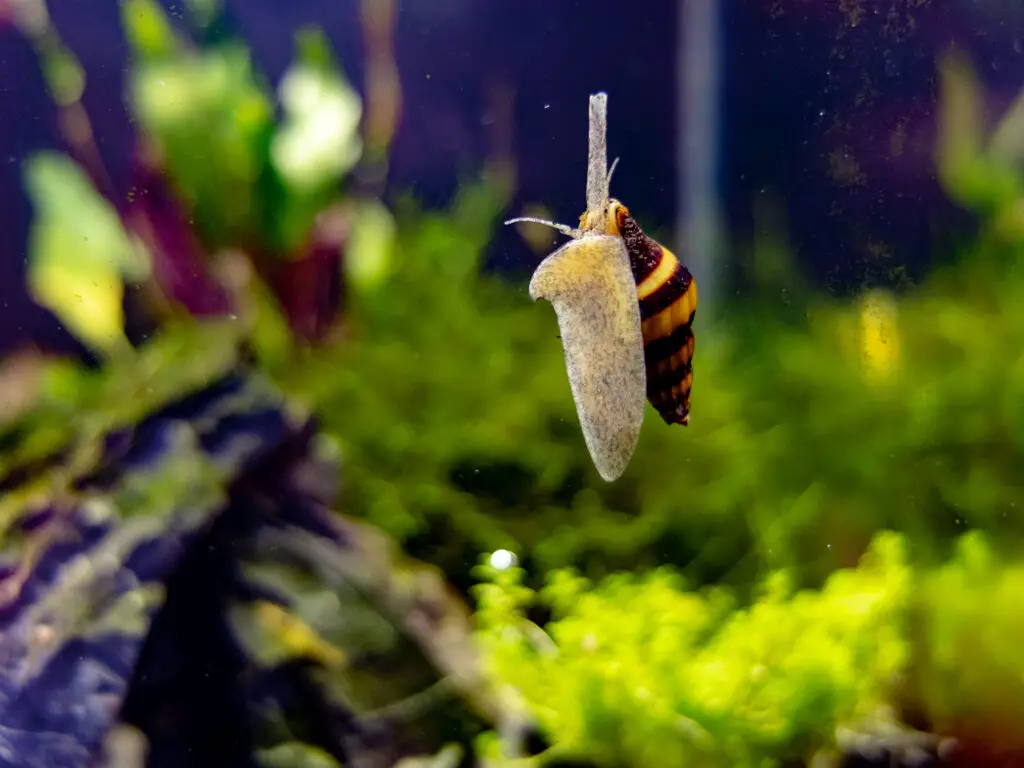
An informative article on avoiding a snail apocalypse and an excellent general discussion on snail predators is available from Kate Barrington on the PetGuide.com web page.
Starving And Baiting The Snails
Snails are very happy to eat leftover fish food. A common failing of enthusiasts is to over-feed their fish, resulting in an unconsumed excess that attracts snails and encourages breeding—ensuring that there is no surplus fish food available for snails to scavenge means that the adults are less vigorous and less likely to produce offspring. A starving snail is also more likely to fall for well-chosen bait.
Most snails are partial to tasty vegetables, which can be used as bait. Placing small pieces of lettuce, cucumber, or carrot in a pond or aquarium will usually attract several snails overnight. Individuals congregated there can be removed by hand or siphon.
Alternatively, a simple snail trap could be made from a container with holes big enough for a snail to enter but too small for a fish. If several snails are attracted by the vegetable bait inside, they will have difficulty finding a way to escape from the trap.
Using Poison To Kill The Snails
Several chemical compounds are recognized as efficient snail killers, but the concern is always what the effect will be on other plants, fish, and invertebrates. Copper compounds can kill algae and bacteria and be highly toxic to other organisms like shrimp and oysters. Still, careful control of the dosages involved is reputed to destroy undesirable snails without the risk of harming the fish.
Any thought of using a chemical poison should be considered carefully. While this may seem an efficient and effective method of ridding the pond of a snail infestation, adding chemicals can have an adverse and long-lasting effect on water quality. In addition, if dead snails are not removed within about 24 hours, their decomposition may generate toxins harmful to the fish.
After treatment, it would be wise to ensure that all traces of the chemical poison have been removed and perform significant pond water changes.
For details on a well-known treatment for snail control, refer to the copper sulfate pentahydrate discussion on the Aquatic Community web page.
Conclusion
Koi are omnivorous and will eat snails, but that would typically be only a tiny part of their diet. They will eat plants, insects, and algae but are not noted as snail-eaters. Relying on them to keep a snail population under control is not likely to be successful, so other remedies would need to be investigated.
Introducing predatory fish with a preference for snails may be a practical solution, and trapping snails using vegetable bait is often effective. Snail poison is an option as a last resort, but such measures must be handled cautiously. Incorrect dosage in a pond could potentially kill all the inhabitants.
References
https://en.wikipedia.org/wiki/Koi
https://nationalzoo.si.edu/animals/japanese-koi
https://www.fishkeepingworld.com/koi-fish/#h25
https://www.animalpicturesarchive.com/does-koi-fish-eat-snails/
https://www.petguide.com/blog/invertebrates/fish/aquarium-snails-the-good-the-bad-and-the-ugly/
https://animals.mom.com/freshwater-snails-babies-5832.html
https://www.aquaticcommunity.com/snail/coppersnail.php
https://ansp.org/exhibits/online-exhibits/stories/deadly-snails/
https://animals.mom.com/poisonous-snails-3559.html
https://idpjournal.biomedcentral.com/articles/10.1186/s40249-018-0414-7
